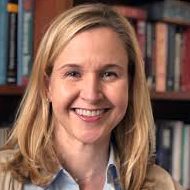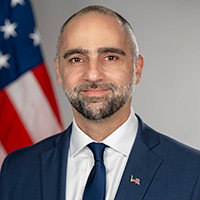

Princeton SPIA Welcomes New Faculty Members for 2024-25 Academic Year
The Princeton School of Public and International Affairs (SPIA) will welcome 11 new faculty members for the upcoming academic year. These individuals have dual appointments in the departments of economics, anthropology, African American studies, psychology, and sociology.
"I’m thrilled to welcome these outstanding scholars to Princeton SPIA," said Amaney Jamal, dean of the School. "Their diverse expertise will provide our students the foundational skills and knowledge to become leaders inside and outside the classroom."
New SPIA Faculty

Pauline Carry, an assistant professor of economics and international affairs, is a labor economist and a macroeconomist. Her research focuses on how employment contracts are formed and terminated, and the effects of labor market institutions aiming at regulating those contracts. She investigates the effects of labor reforms at the microeconomic level and their macroeconomic impact. Her work combines survey and administrative data, as well as theory and econometric methods. Carry has studied the effects of introducing a legal minimum working time of 24 hours per week in France. She analyzed the impacts on firm-level outcomes such as employment and output, gender inequality, and aggregate unemployment.

Navroz Dubash, a professor of public and international affairs, has been actively engaged in the climate debate as a scholar, policy adviser, and activist for 25 years. He was a professor at the Centre for Policy Research, where he conducted research and wrote on climate change, energy, air pollution, water policy, and the politics of regulation in the developing world. Dubash was instrumental in establishing the global Climate Action Network in 1990 and has since written widely about climate politics, policy, and governance. He is currently a Coordinating Lead Author for the Intergovernmental Panel on Climate Change (Sixth Assessment), advises the UNEP Emissions Gap Report Steering Committee, and has been a member of the Scientific Advisory Group of the UN Climate Action Summit. Within India, Navroz has been a member of the group that developed the country’s Low Carbon Strategy for Inclusive Growth and the Committee for a Long Term Strategy for Low Carbon Development for India.

Amelia Frank-Vitale, an assistant professor of anthropology and international affairs, is an anthropologist of migration, deportation, and violence in Central America and Mexico. Her current research project examines how Hondurans navigate life after being deported back to neighborhoods labeled as some of the world’s most violent. Her work connects regional immigration and security policies, organized crime, state violence, and the everyday experience of life in and around San Pedro Sula. Her work has been supported by the Wenner-Gren Foundation, the Social Sciences Research Council, the Inter-American Foundation, and the American Council of Learned Societies.

Simon Jager, a professor of economics and public affairs, focuses on labor markets and explores the origins and consequences of inequality. His work encompasses various aspects of labor economics, including competition in the labor market, unions and worker representation, unemployment, and the role of psychological factors in labor market dynamics. Jager’s methodological approach combines experimental and quasi-experimental methods, often utilizing large administrative datasets from countries such as Germany, Finland, and Argentina. Among his research contributions, Jager has studied the causal effects of giving workers the right to participate in their firm's decision-making and electing employee board representatives on outcomes such as productivity and wages. Beyond his academic work, Simon plays an active role in policy advice and public discourse. He serves as an advisor to the German Minister for the Economy and the German Chancellery.

Ilyana Kuziemko is the Theodore A. Wells ’29 Professor of Economics, co-director of the Griswold Center for Economic Policy Studies, and co-director of the Princeton Program in Public Finance. Kuziemko re-joined the Princeton faculty in 2014, after teaching at Columbia Business School, where she was the David W. Zalaznick Associate Professor of Business. From 2009-10, Kuziemko served as assistant secretary for economic policy at the U.S. Department of the Treasury, where she worked primarily on the development and early implementation of the Affordable Care Act. Her research interests are in the areas of public finance, political economy, and labor economics, with a focus on U.S. economic inequality and in particular its interaction with political and labor-market institutions. She also is a fellow of the Econometric Society and a research associate at the National Bureau of Economic Research.

Khalil Gibran Muhammad, a professor of African American studies and public affairs, directed the Institutional Antiracism and Accountability Project at Harvard University and is the former director of the Schomburg Center for Research in Black Culture, a division of the New York Public Library and the world’s leading library and archive of global Black history. Muhammad’s scholarship examines the broad intersections of racism, economic inequality, criminal justice, and democracy in U.S. history. He is co-directing a National Academy of Sciences study on reducing racial inequalities in the criminal justice system. Muhammad was an associate editor of The Journal of American History and an Andrew W. Mellon fellow at the Vera Institute of Justice. He is a member of the Society of American Historians and the American Antiquarian Society.

Ali Nouri, a lecturer of public and international affairs, most recently served as a deputy assistant to the President and a deputy director in the White House Office of Legislative Affairs. Before that, he was an assistant secretary in the U.S. Department of Energy, where he led the Office of Congressional and Intergovernmental Affairs. Before joining the Biden administration, Nouri was the president of the Federation of American Scientists, a public policy organization focused on countering WMDs, addressing infectious diseases, and crafting solutions to energy and innovation challenges. Previously, he served as a U.S. Senate staffer for nearly a decade in several roles including as a national security advisor, an energy and environment advisor, and a legislative director. Before the Senate, he was an advisor in the office of U.N. Secretary General Kofi Annan, where he developed initiatives aimed at reducing the risk of biological weapons.

Ayşegül Şahin, a professor of economics and public affairs, specializes in empirical macroeconomics. Şahin has taught since 2018 at the University of Texas at Austin as the Richard J. Gonzalez Regents Chair in Economics. Before that, she was a research economist at the Federal Reserve Bank of New York from 2004 to 2018. Her work focuses on topics that include unemployment, labor force participation, entrepreneurship, and inflation. Her research on macro-labor issues has been supported by the National Science Foundation. Şahin is the editor of the American Economic Journal: Macroeconomics, is a research associate of the National Bureau of Economic Research, and serves on the Economic Advisory Panel to the Congressional Budget Office, in addition to holding advisory roles at the Bureau of Labor Statistics, the Carnegie-Rochester-NYU conference, and the Federal Reserve Bank of San Francisco, among others.

Anuj Shah, an associate professor of psychology and public affairs, joins Princeton University from the University of Chicago Booth School of Business. Shah’s research uses cognitive and social psychology as a lens into social issues, drawing on both laboratory experiments and large-scale field studies. In one line of work, he has examined how people make decisions when they lack resources, like money or time, with a particular focus on how poverty affects decision-making. In another line of work, he has studied how behavioral science can be used to improve criminal justice policies (such as how courts communicate with defendants and how police officers are trained) and programs to reduce involvement in crime.

Florencia Torche, the Edwards S. Sanford Professor of Sociology and International Affairs, specializes in social stratification and mobility. Torche comes to Princeton from Stanford University, where she has taught since 2016, most recently as the Dunlevie Family Professor of Sociology. Before that, she taught at New York University from 2006 through 2016 and at Queens College CUNY from 2004 to 2006. Torche has written 47 peer-reviewed articles and numerous book chapters, book reviews, and other public-facing articles, in both English and Spanish. She has received major grants from the National Science Foundation, the Ford Foundation, the United Nations, and the National Institute of Child Health and Human Development, among others. She has been elected to the National Academy of Sciences (NAS) and the American Academy of Arts and Sciences, and she is a member of the NAS working group addressing the long-term impact of the COVID-19 pandemic on children and families.

Zeynep Tufekci, the Henry G. Bryant Professor of Sociology and Public Affairs, is an academic and writer who focuses on big social challenges that defy disciplinary boundaries and simple answers. She is the author of Twitter and Tear Gas: The Power and Fragility of Networked Protest and writes regularly for The Atlantic and The New York Times, as well as publishing a newsletter named Insight.

